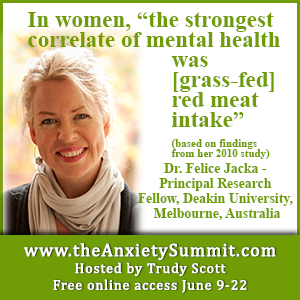Dr. Felice Jacka, Principal Research Fellow at Deakin University, Melbourne, Australia, is interviewed by host of the Anxiety Summit, Trudy Scott, Food Mood Expert and Nutritionist, author of The Antianxiety Food Solution.
The Research: Food to prevent and treat anxiety and depression?
- Organizations and collaboration in nutritional psychiatry research and prevention
- Study: Traditional diet lowers the risk of anxiety and depression in women
- The surprising benefits of grass-fed red meat for improved mood
- Food and mental health research in Norway, Japan, UK and Spain, across all ages and socioeconomic levels
- Ongoing research on diet to prevent depression and future research on the gut
These are the two organizations we talked about:
Dr Jacka said she “initiated this society at the end of 2012 really in recognition of the need to get people collaborating and working together and creating those synergies to push this field forward”
Here are some great gems from our interview:
we take the point that prevention is better than cure
there is no mental health without physical health
treating the whole person- their physical health as well as their mental health – is critical
We’ve now seen data from right around the world right across every continent and across age ranges, showing that diet really does matter to the prevalence and incidence of depression and anxiety.
Study: Association of Western and Traditional Diets with Depression and Anxiety in Women
We discussed the results of her Ph.D. paper that was published in the American Journal of Psychiatry in 2010: “Association of Western and Traditional Diets with Depression and Anxiety in Women.”
This study was published on the front cover of the journal with a big editorial and was nominated the most important study of 2010 in psychiatry research. It was considered really huge news in psychiatry.
a “traditional” dietary pattern characterized by vegetables, fruit, meat, fish, and whole grains was associated with lower odds for major depression or dysthymia and for anxiety disorders. A “western” diet of processed or fried foods, refined grains, sugary products, and beer was associated with a higher odds of mood disorders
We discussed the connection between red meat and mental health especially in women.
Dr. Jacka shared this: “One of the hypotheses that I had during the Ph.D. was that increased intake of animal foods would be toxic” and “would be associated with more mental disorders.”
This did not turn out to be the case. “In our study, out of every single dietary food grouping that I looked at including vegetables, fruits, salads, beans, etc the strongest correlate of mental health was red meat intake,” grass-fed red meat of course.
“Consistently, women who have less than the recommended intake of red meat seem to be in an increased risk for common mental disorders” (like anxiety and depression) “and bipolar disorder.
Women only need a small amount (a palm-sized serving) three or four times a week.
These are pretty profound results, especially in this day and age where people are being cautioned to eat no red meat or to eat less. I encourage all my clients to eat red meat, grass-fed of course. It’s a wonderful source of amino acids, zinc, iron and omega-3 fatty acids – all important for depression and anxiety.
The first randomized controlled trial
Dr. Jacka is looking for participants for the first randomized controlled trial looking at diet as a therapeutic approach for depression. They are seeking the following study participants: those with major depression, who are over 18, with no dietary restrictions and who live in Melbourne.
There is additional information on the Diet Depression Study page.
UPDATE March 2017:
Here is the outcome of the study: SMILES diet depression trial: reduced depression and anxiety
It’s the first randomized controlled diet depression study and ONE THIRD of the dietary intervention group saw improvements in their depression symptoms. This was just diet alone and switching from processed/junk food to real food with no specific dietary restrictions.
With regards to quality animal protein, it did include fish (at least 2 per week); lean red meats (3–4 per week), chicken (2–3 per week) and eggs (up to 6 per week).
